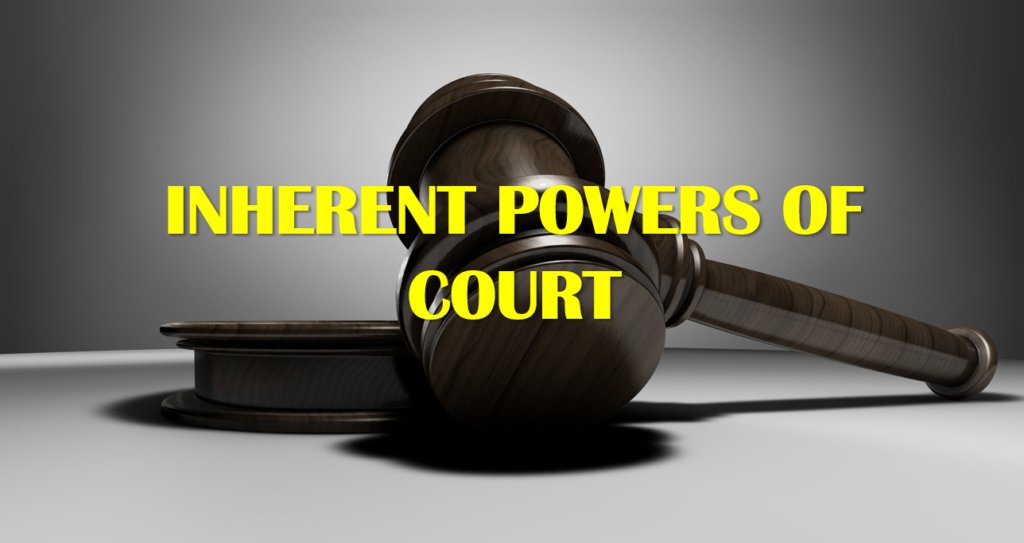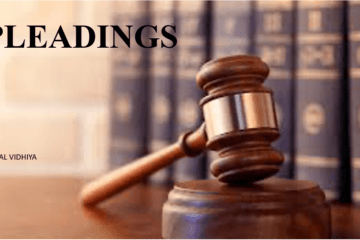
Introduction
The term “inherent” means “natural” or “existing and inseparable from something. Hence, as the term suggests inherent powers are those powers which may be exercised by a court to do full and complete justice between the parties before it.
Every court is constituted certain powers for the purpose of administering justice between the parties. All such powers are necessary to do the right and to undo the wrong in the course of administration of justice. Such powers are complementary in nature and the court is free to exercise them for the ends of justice or to prevent the abuse of powers of court. Such powers are known as “inherent powers of the court.”
The provisions of the Code are not exhaustive for the simple reason that the legislature is incapable of contemplating all the possible eventualities and circumstances which may arise in future legislation. These inherent powers come to reassure in such unforeseen circumstances. They can be exercised ex debito justitiae in absence of express provisions in the Code.
Section 148 to 153-B of the Code deals with inherent powers of the Courts. These provisions relating to inherent powers apply only to courts and not to other authorities.
Enlargement of Time
Section 148 states that Where any period is fixed or granted by the Court for the doing of any act prescribed or allowed by this Code, the Court may, in its discretion, enlarge such period, even though the period originally fixed or granted may have expired.
This power is exercisable in the absence of any specific provision to the contrary which curtails or denies or withholding of the period.
In Jagdhayan vs. Balu Ram (AIR 1983 SC 59) the court stated that this power of enlargement of time is discretionary in nature. In other words, this power of court may be exercised after taking into consideration various factors relating the case, such as conduct of the party seeking extension, alteration or modification which necessitates the extension of time.
Payment of Court Fees
According to Section 149, “Where the entire or a portion of any fee commanded for any certificate by the law for the time being in force relating to court-fees has not been met, the Court may, in its discretion, at any step, permit the person by whom such fee is payable, to pay the whole or part as the case may be, of such court-fee; and upon such payment, the document, in regard of which such fee is payable, shall have the same force and result as if such fee had been paid in the initial situation.”
Payment of requisite court fee is mandatory for any document chargeable with court-fee to be recorded in the court. If the requisite court fee is paid within the time-fixed by the court, it cannot be treated as time-barred. Such payment made within the time fixed by the court retrospectively validates a defective document.
This section empowers the court to allow a party to make up the deficiency of court fees payable on a plaint or memorandum of appeal etc., even after the expiry of limitation period, provided for filing of the suit or appeal etc.
Transfer of Business
Section 150 states that save as otherwise provided, where the business of any Court’ is transferred to any other Court, the Court to which the business is so transferred shall have the same powers and shall perform the same duties as those respectively conferred and imposed by or under this Code upon the Court from which the business was so transferred.
It simply means that when the business of any court is transferred to any other court, the transferee court will exercise the same power or discharge same duties conferred or imposed by CPC upon the transfer court.
Ends of Justice
Section 151 provides that the inherent power can be exercised to secure the ends of justice.
In the case of Debendranath v Satya Bala Dass (AIR 1950 Cal 217) the meaning of “ends of justice” was explained. It was held that “ends of justice” are solemn words, also these words are not merely a polite expression as per juristic methodology. These words also indicate that Justice is the pursuit and end of all law. However, this expression is not vague and indeterminate notion of justice according to laws of the land and statutes. few instances whereby they the court exercises this power are:
- The court may recall its orders and correct mistakes;
- Issuance of temporary injunctions when the case is not covered by order 39 or to set aside an ‘exparte’ order;
- Court can restore the suit and rehear on merits and also to review its order
- Subsequent events in the case can be take note of by the court;
This section also provides for exercise of inherent powers to prevent abuse of the process of court. The abuse of the power may be at the instance of a party or at the instance of the court itself.
Amendment of judgments, decrees, orders, and other records
Sec 152 provides that clerical or arithmetical mistakes in Judgments, decrees or orders arising from any accidental slip or omission may at any time be corrected by the court either on its own motion or on the application of any of the parties. In the case of T. Sugar Cp. Ltd., (AIR 1970 SC 76) the Supreme Court stated that section 152 is based on two principles:
- The act of the court shall not prejudice any one; and
- Duty of the court to ensure that its records are true and represent the correct state of affairs.
Sec 153 confers a general power on the court to amend defects or errors in any proceeding in a suit. Necessary amendments can be done in order to determine the real issues between the parties.
Power to amend decree or order where an appeal is summarily dismissed and place of the trial to be deemed to be open Court are defined under Section 153A and 153B of the Code.
Limitations
Through inherent powers are to be exercised to achieve the ends of justice, there are certain limitations to these inherent powers of court. These limitations include:
- They can be applied only in the deficiency of particular provisions in the Code;
- They cannot be applied in dispute with what has been expressly given in the code;
- They can be applied in rare or exceptional cases;
- While operating the powers, the court has to follow the method shown by the legislature;
- Courts can neither exercise jurisdiction nor entrust in them by law;
- To abide by the principle of Res Judicata i.e., not to open the issues which have already been decided finally;
- To pick a mediator to make an award afresh;
- Substantive rights of the parties shall not be taken away;
- To limit a party from taking proceedings in a court of law; and
- To set apart an order which was valid at the moment of its issuance.




0 Comments